汉译英及被动语翻译
- 格式:ppt
- 大小:337.00 KB
- 文档页数:39

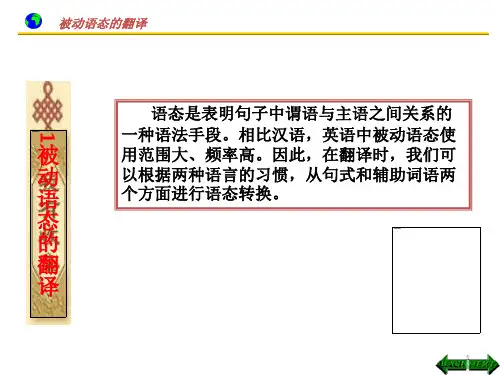
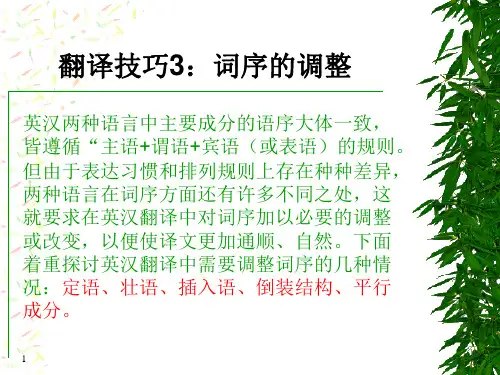
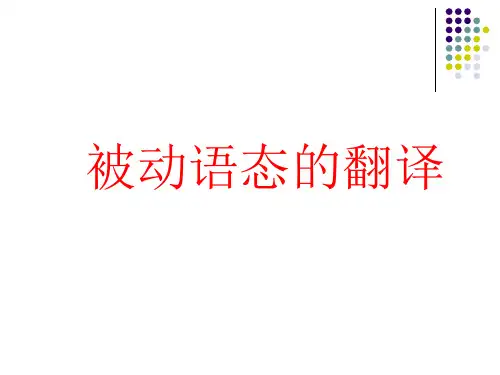
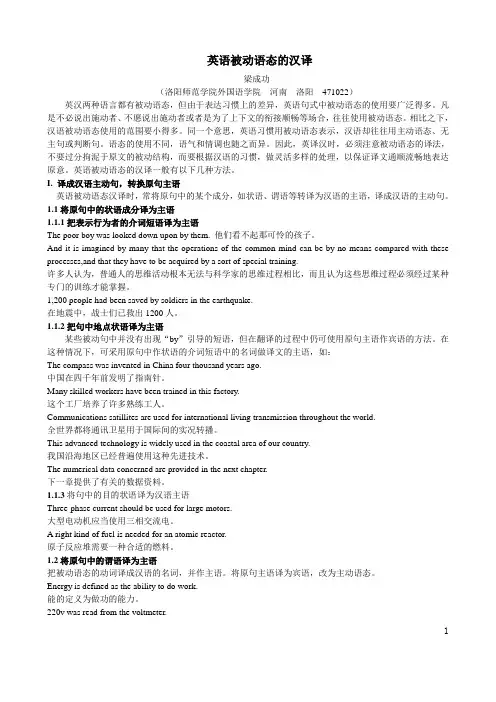
英语被动语态的汉译梁成功(洛阳师范学院外国语学院河南洛阳471022)英汉两种语言都有被动语态,但由于表达习惯上的差异,英语句式中被动语态的使用要广泛得多。
凡是不必说出施动者、不愿说出施动者或者是为了上下文的衔接顺畅等场合,往往使用被动语态。
相比之下,汉语被动语态使用的范围要小得多。
同一个意思,英语习惯用被动语态表示,汉语却往往用主动语态、无主句或判断句。
语态的使用不同,语气和情调也随之而异。
因此,英译汉时,必须注意被动语态的译法,不要过分拘泥于原文的被动结构,而要根据汉语的习惯,做灵活多样的处理,以保证译文通顺流畅地表达原意。
英语被动语态的汉译一般有以下几种方法。
I. 译成汉语主动句,转换原句主语英语被动语态汉译时,常将原句中的某个成分,如状语、谓语等转译为汉语的主语,译成汉语的主动句。
1.1将原句中的状语成分译为主语1.1.1把表示行为者的介词短语译为主语The poor boy was looked down upon by them. 他们看不起那可怜的孩子。
And it is imagined by many that the operations of the common mind can be by no means compared with these processes,and that they have to be acquired by a sort of special training.许多人认为,普通人的思维活动根本无法与科学家的思维过程相比,而且认为这些思维过程必须经过某种专门的训练才能掌握。
1,200 people had been saved by soldiers in the earthquake.在地震中,战士们已救出1200人。
1.1.2把句中地点状语译为主语某些被动句中并没有出现“by”引导的短语,但在翻译的过程中仍可使用原句主语作宾语的方法。
在这种情况下,可采用原句中作状语的介词短语中的名词做译文的主语,如:The compass was invented in China four thousand years ago.中国在四千年前发明了指南针。
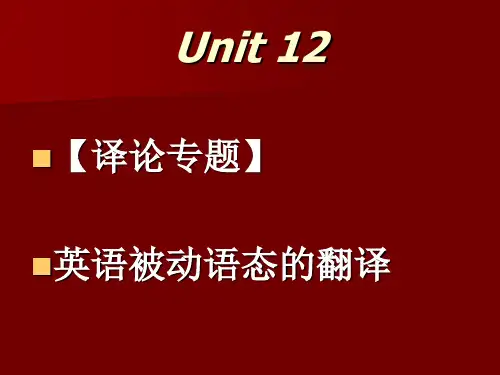

举例说明汉语和英语被动语态的差异在将近半个学期的汉译英的学习中,我对汉语和英语被动语态有了初步的认识,大概总结如下:1.汉语被动语态:汉语的动词基本上无形态变化,所以动词本身无被动语态,主动与被动主要使用一些词汇手段,或纯粹靠意合,依靠动词本身的意义和上下文来显示主动和被动。
(1)有形式标志的被动句。
这类被动句的标志有“被”、“给”、“让”等。
例如:①他被一块大石头砸伤了。
He was hurt by a big stone.②庄家让洪水冲毁了。
The crops were washed away by the flood.(2)使用一些词汇手段表示被动句,如“受到”、“遭到”、“得到”等。
例如:①他们在工厂受到欢迎。
They were welcomed in the factory.②计算机的应用应予以足够的重视。
The application of computers should be paid enough attention to.(3)意义被动,被动意义完全靠汉语的意合来体现。
例如:①他已派到国外当翻译。
He has been sent abroad as an interpreter.②这种菜闻起来很香。
The dish smells wonderful.2.英语被动语态:通过词的屈折变化来体现。
(1)英语结构被动句:①施事原因。
因各种因素,不愿说出施动者。
例如:Children should be taught to respect the old.应该教导孩子们尊重老人。
②修辞和结构的需要。
有时为了更好的连接上下文,避免变换主语。
例如:The teachers should respect student first,and then still be respected by the students. 教师首先应该尊重学生,然后才会受到学生的尊重。
(2)英语意义被动句:①作谓语的动词是由及物动词转化而来的不及物动词。
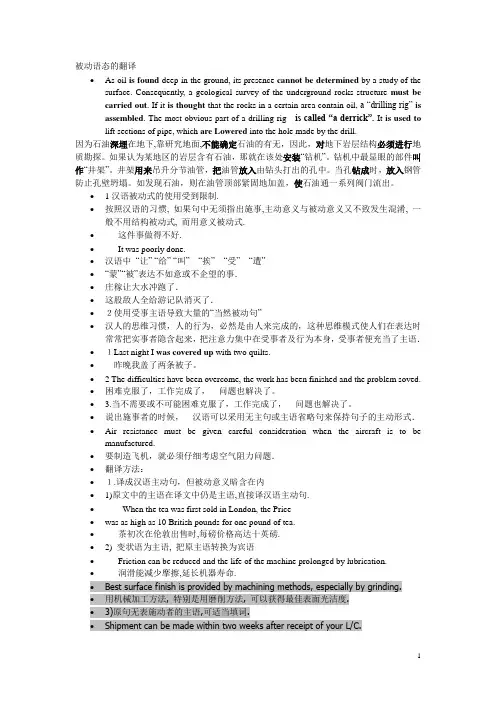
被动语态的翻译•As oil is found deep in the ground, its presence cannot be determined by a study of the surface. Consequently, a geological survey of the underground rocks structure must be carried out. If it is thought that the rocks in a certain area contain oil, a “drilling rig” is assembled. The most obvious part of a drilling rig is called “a derrick”. It is used to lift sections of pipe, which are Lowered into the hole made by the drill.因为石油深埋在地下,靠研究地面,不能确定石油的有无,因此,对地下岩层结构必须进行地质勘探。
如果认为某地区的岩层含有石油,那就在该处安装“钻机”。
钻机中最显眼的部件叫作“井架”。
井架用来吊升分节油管,把油管放入由钻头打出的孔中。
当孔钻成时,放入钢管防止孔壁坍塌。
如发现石油,则在油管顶部紧固地加盖,使石油通一系列阀门流出。
•1汉语被动式的使用受到限制.•按照汉语的习惯, 如果句中无须指出施事,主动意义与被动意义又不致发生混淆, 一般不用结构被动式, 而用意义被动式.•这件事做得不好.•It was poorly done.•汉语中“让” “给” “叫”“挨”“受”“遭”•“蒙”“被”表达不如意或不企望的事.•庄稼让大水冲跑了.•这股敌人全给游记队消灭了.•2使用受事主语导致大量的“当然被动句”•汉人的思维习惯,人的行为,必然是由人来完成的,这种思维模式使人们在表达时常常把实事者隐含起来,把注意力集中在受事者及行为本身,受事者便充当了主语.•1Last night I was covered up with two quilts.•昨晚我盖了两条被子。
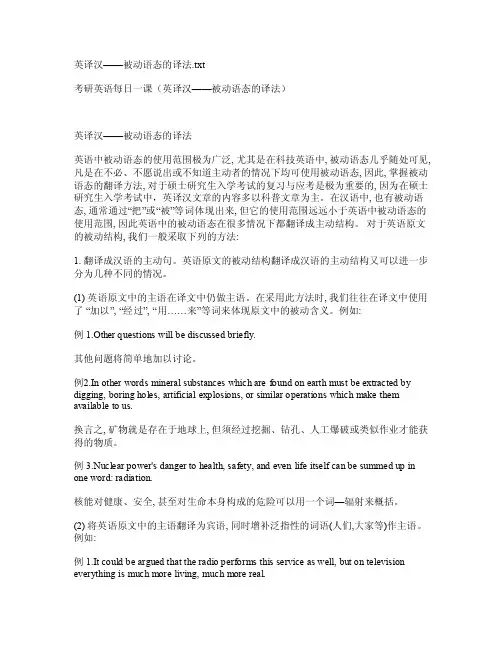
英译汉——被动语态的译法.txt考研英语每日一课(英译汉——被动语态的译法)英译汉——被动语态的译法英语中被动语态的使用范围极为广泛, 尤其是在科技英语中,被动语态几乎随处可见, 凡是在不必、不愿说出或不知道主动者的情况下均可使用被动语态, 因此, 掌握被动语态的翻译方法,对于硕士研究生入学考试的复习与应考是极为重要的,因为在硕士研究生入学考试中,英译汉文章的内容多以科普文章为主。
在汉语中, 也有被动语态,通常通过“把”或“被”等词体现出来, 但它的使用范围远远小于英语中被动语态的使用范围, 因此英语中的被动语态在很多情况下都翻译成主动结构。
对于英语原文的被动结构, 我们一般采取下列的方法:1.翻译成汉语的主动句。
英语原文的被动结构翻译成汉语的主动结构又可以进一步分为几种不同的情况。
(1) 英语原文中的主语在译文中仍做主语。
在采用此方法时, 我们往往在译文中使用了“加以”, “经过”, “用……来”等词来体现原文中的被动含义。
例如:例1.Oth er qu estio ns wi ll be disc ussed brie fly.其他问题将简单地加以讨论。
例2.In o therwords mine ral s ubsta nceswhich arefound on e arthmustbe ex tract ed bydigg ing,borin g hol es, a rtifi cialexplo sions, orsimil ar op erati ons w hichmakethemavail ableto us.换言之, 矿物就是存在于地球上,但须经过挖掘、钻孔、人工爆破或类似作业才能获得的物质。
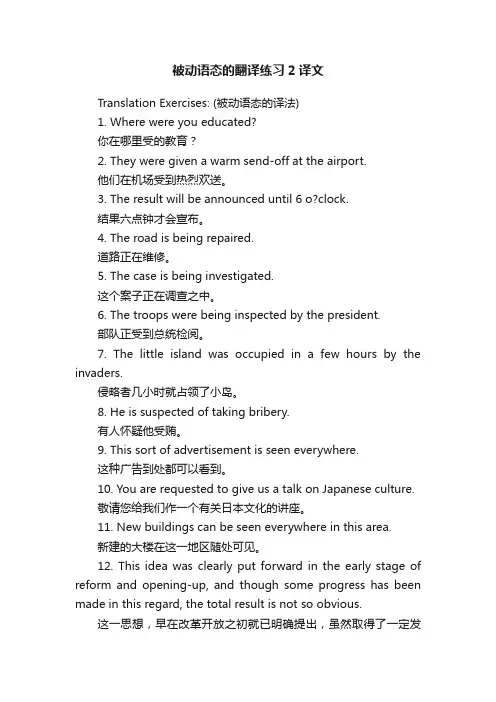
被动语态的翻译练习2译文Translation Exercises: (被动语态的译法)1. Where were you educated?你在哪里受的教育?2. They were given a warm send-off at the airport.他们在机场受到热烈欢送。
3. The result will be announced until 6 o?clock.结果六点钟才会宣布。
4. The road is being repaired.道路正在维修。
5. The case is being investigated.这个案子正在调查之中。
6. The troops were being inspected by the president.部队正受到总统检阅。
7. The little island was occupied in a few hours by the invaders.侵略者几小时就占领了小岛。
8. He is suspected of taking bribery.有人怀疑他受贿。
9. This sort of advertisement is seen everywhere.这种广告到处都可以看到。
10. You are requested to give us a talk on Japanese culture.敬请您给我们作一个有关日本文化的讲座。
11. New buildings can be seen everywhere in this area.新建的大楼在这一地区随处可见。
12. This idea was clearly put forward in the early stage of reform and opening-up, and though some progress has been made in this regard, the total result is not so obvious.这一思想,早在改革开放之初就已明确提出,虽然取得了一定发展,但总体效果还不明显。
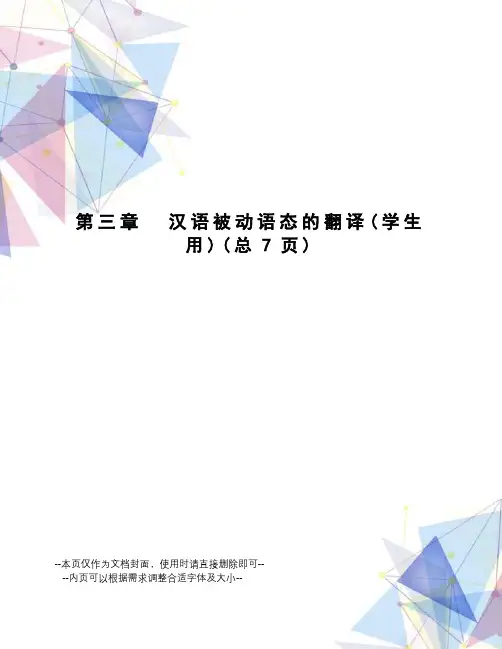
第三章汉语被动语态的翻译(学生用)(总7页)--本页仅作为文档封面,使用时请直接删除即可----内页可以根据需求调整合适字体及大小--第三章汉语被动语态的翻译(学生用)(一)汉语被动语态的三种表达方式第一、显性被动1.(被、叫、给、让 + 及物动词)①一朝被蛇咬,十年怕井绳。
A burnt child dreads the fire.A. He who is bitten once by a snake, for ten years will be afraid of a grass rope.B. Once bitten by a snake, he will be afraid of a grass rope for ten years.②他自我感觉总那么好,可这次被冷落了。
He is always full of himself but this time he has been left out in the cold.2.(受、遭受、蒙、蒙受)①龙游浅水遭虾戏了。
A dragon is stranded in shallow water — a gigantic creature is reduced to being teased by shrimps.②翌年楚因战败而蒙辱于秦。
The next year the Kingdom of Chu was humiliated by the Kingdom of Qin due to its military defeat.③公子受宠于君。
You are now in the Emperor’s favour.第二、半隐性被动⑴“为……(所)……”式①茅屋为秋风所破。
The thatched house was destroyed by the autumn storm.②幽王击鼓,诸候兵不至,幽王之身乃死于骊山之下,为天下笑。
King You beat the drum to ask the dukes and princes to send their troops to his rescue but they all refused. King You died at the foot of Mount Li, the object of universal ridicule.(turning himself into a laughing stock)⑵“是……的”式①历史是人民创造的。
第三章:被动语态各种形式的被动语态1各种形式的被动语态p1185 汉译英9。
2。
1 一般时态的被动语态9。
2。
2 进行时的被动语态9。
2。
3 完成时的被动语态1.The girl is called Lily. 这个女孩叫莉莉。
2.He is respected by everybody. 他受到大家的尊敬。
3.The floor is mopped every day. 地板每天都檫。
4.The president is elected every four years. 总统每四年选举一次。
5.The book was written by Dickens. 这本书是狄更斯写的。
6.Where were you educated? 你在哪里受的教育?7.They were given a warm send-off at the airport. 在机场他们手到热烈的欢送。
8.The conference was held at the Great Hall of the People. 这次大会是在人民大会堂举行的。
9.When will the project be completed? 这项工程什么时候完工?10.The spacecraft will be launched tonight. 宇宙飞船将于今晚发射。
11.He won’t be invited to the party. 他将不被邀请参加这个party。
12.He was afraid he would not be admitted. 他担心不会被录取。
13.She little thought she would be invited. 她没有想到她受到邀请。
14.I was sure I would be well treated. 我那时就是我会受到优待。
15.We knew she would be praised for it 我们知道她会因此受到表。
被动语态的译法(Translation of the Passive)英语中被动语态使用范围很广。
凡是在不必说出主动者、不愿说出主动者、无从说出主动者或者是为了便于连贯上下文等场合,往往都用被动语态。
汉语中虽也有被动语态,但使用范围狭窄得多。
英语被动语态的句子,译成汉语时,很多情况下都可译成主动句,但也有一些可以保持被动语态。
一、译成汉语主动句英语被动语态的句子译成汉语主动句可有几种不同情况:(一)原文中的主语在译文中仍为主语1)The whole country was armed in a few days.几天之内全国武装起来了。
2) The sense of inferiority that he acquired in his youth has never been totally eradicated.他在青少年时期留下的自卑感,还没有完全消除。
3)Most trees are denuded of leaves in winter.大多数树木冬天要落叶。
4)He has been wedded to translation.他与翻译结下了不解之缘。
5)She was delivered of a boy.她生了一个男孩。
6) Visitors are requested to wait.来宾请等候。
7) He was given a prize.他得了奖。
8) I have the honor of being elected.我荣幸地当选了。
(二)原文中的主语在译文中作宾语1)By the end of the war 800 people had been saved by the organization,but at a cost of over 200 Belgian and French lives.战争结束时,这个组织拯救了八百人,但那是以二百多比利时人和法国人的生命为代价的。
翻译的基本技巧——语态转换译法语态转换译法1 顺译法顺译成被动句顺译成主动句2 倒译法把by后的宾语倒译成汉语的主语把其他介词后的宾语倒译成汉语的主语倒译成汉语的无主句3 分译法一、顺译法既保留原文的主语,又要使译文主要成分的顺序和原文大体一致的翻译方法就叫顺译法。
1 顺译法 (Translation in Original Order)1. 1 顺译成被动句A.译成“被”字所谓“被”字句,就是在汉语的动词前面加上一个“被”字来表示被动的句子。
主要表示这个动作不利于受事者或这个情况有点特殊,或者出乎意料。
加上“被”字以引起读者的注意并表示“被”这一动作动作接受者(受事者)是不乐意或不情愿接受的。
例1:Vitamin C is destroyed when it is overheated.【译文】维生素C受热过度就会被破坏。
例2:Once the flower has been pollinated and fertilized, the plant provides the newly formed seeds with a reserve of food materials, which will be needed when they themselves germinate.【译文】花一旦被授了粉并受了精,植株就会对新生种子提供养料贮藏,以备种子未来发芽之需。
例3:She thought all was fair and legal, and never dreamt she was going to be entrapped into a feigned union with a defrauded wretched, already bound to a bad, mad, and imbruted partner! (Charlotte Bront?: Jane Eyre)【译文】她以为一切都是公正合法的,做梦也没想到过自己竟会被诱入欺诈婚姻的圈套,跟一个骗子、疯子、十足的坏蛋缔结姻缘。